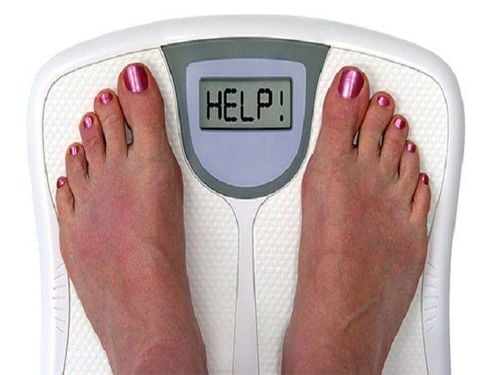Losing weight is not an easy task, as it requires continuous effort, a strict diet, and an exercise regimen. Furthermore, weight loss does not always produce the desired results, and improper methods can even negatively impact your health. So, how much weight can you safely lose in a short period (such as a month) while ensuring that you remain healthy?
1. How much weight is safe to lose in a month?
Normally, finding the right diet and exercise plan that works best for you is an experiment. Even once you have figured it out, you may find that your body does not respond to the changes you have made. This is because weight loss can depend on several factors, including metabolism rate, initial body weight, sleep schedule, and more.
Weight loss depends on factors such as age, gender, physical activity level, and the side effects of certain medications. Therefore, the rate and extent of weight loss vary from person to person. Dr. Elizabeth Lowden, an endocrinologist at the Northwestern Medicine Weight Loss Surgery and Metabolic Health Center in the United States, states that a general guideline is to lose between 0.45 kg to 0.9 kg per week or 1.6 kg to 3.6 kg per month. In other words, this is about 5-10% of your body weight.
Dr. Lowen explains: If you want to lose 0.5 kg per week, you would need to consume approximately 3,500 fewer calories, or 5000 fewer calories each day than your body needs to maintain your current weight.
When trying to lose weight, having a meal plan or exercise routine with a goal - such as fitting into your favorite dress or preparing for a special event - can provide motivation to lose weight and maintain it. The key is to focus on improving your eating habits and physical activity rather than just on the weight loss itself
SEE MORE: Questions and answers about weight loss surgery

Dr. Amy Gelel from the Austin Area Clinic explains, “Exercise increases your metabolism and builds more such muscle, allowing you to continue burning calories after your workout”
Some strength training exercises like weight lifting or bodyweight exercises, along with some high-intensity interval training, can help boost your metabolism for further weight loss. Steady-state aerobic exercise can also help burn some calories.
The good news is that you do not need to lose a lot of weight before you start noticing positive health changes. According to the CDC: if you are overweight or obese, losing just 5 to 10% of your body weight can improve blood pressure, cholesterol, and reduce the risk of diabetes.
However, remember that the first week of your weight loss plan may show irregular results. You may lose 2.2 kg to 5 kg in the first week, but the following weeks may show no further weight loss. This is entirely normal because when you reduce calories and start making healthier food choices, your glycogen stores (molecules created from the carbs you eat) decrease. Since glycogen is bound to water molecules, you will lose water weight as well. Therefore, do not get discouraged if you lose weight quickly at first but then experience a slowdown - that is completely normal.
2. How much weight loss is too much?
Dr. Lowden says: “Unless you are enrolled in a medically supervised weight loss program or have recently undergone weight loss surgery, losing more than 10 pounds a month is very rare.” Remember, when you lose weight too quickly, your body will react against it, Your metabolism slows down, hormones change, increasing hunger cravings, and you may even burn less fat, according to a review in the International Journal of Obesity. Lowden warns that these changes can lead to disordered eating habits.
Furthermore, regardless of how fast you are losing weight, you may also lose some lean muscle mass during the process (especially if you are not exercising to build muscle), and losing too much can severely harm your metabolism. That’s why strength training is so important when trying to lose weight. Additionally, an extremely low-calorie diet can lead to nutritional deficiencies, and rapid weight loss can result in gallstones due to improper functioning of the gallbladder.

3. Why do diets fail for long-term weight loss?
There is a phenomenon known as “yo-yo dieting”, where following a diet for weight loss is not sustainable and ultimately leads to returning to old eating habits. According to Dr. Peter LePort, the medical director of the Memorial Obesity Care Center at Orange Coast Memorial Medical Center in Fountain Valley, California, there is scientific research behind why we gain weight back after quick weight loss programs. “The body will respond quickly when you lose weight rapidly and will feel hungry. If you lose 1 to 2 kilograms per week, your body will adjust and start to feel like this is the weight it should maintain, and at that point, you won’t feel extremely hungry from weight loss.”
The exception to the recommended weight loss range of 0.45 to 0.9 kilograms per week is for people who have undergone weight loss surgery. Dr. LePort mentions that many of his bariatric surgery patients are overweight by 45 kilograms and can lose up to 9 kilograms per month immediately after surgery, followed by around 4.5 kilograms per month, and then 2.2 kilograms per month. The surgery forces them to eat more slowly and consume less food.

4. Safe weight loss strategies
4.1 Trick yourself with weight loss goal
Maciel, a certified endurance and fitness expert based in Cambridge, Massachusetts, says: “It is essential to set realistic goals and expectations before embarking on your weight loss journey. If possible, enlist the help of loss professionals or use tracking apps to monitor your progress with assessments. Then, spend time each week planning your meals and workouts. Once you’ve built confidence by achieving a few smaller goals, you can begin setting higher goals with bigger challenges. For example, start by developing a regular walking habit before progressing to long-distance running.”
4.2 Prepare for weight regain
No matter how hard you try to lose weight, weight regain is something that will inevitably happen to most people, regardless of how much effort you put into your weight loss. But knowing and accepting this as part of the journey helps keep you on track, says Maciel.
SEE MORE: Does sleeping more help with weight loss?
4.3 Find out essential information:
It is important to note that eating more nutrient-rich foods, exercising regularly, getting enough sleep, and taking time to care for yourself are all essential components of following a structured plan. If you are losing weight without following a plan, you should carefully review your eating habits, exercise routine, lifestyle. Consider reaching out to a support group or a nutritionist for guidance.

4.4 Listen to your body
Lowden says, “ When you are making changes to your eating and lifestyle habits, hunger is normal and accompanies reducing your intake, but you should never feel obsessively hungry”. “Always respect your hunger signals with healthier choices”. To avoid overeating, always remind yourself why you are losing weight and what you need to eat to manage your hunger…
While healthy weight loss requires a lot of perseverance and effort, the slow and steady path is the best choice for you. Many people give up because they do not see immediate changes, but consistency is the key to success. You will notice weight changes over time, but you have to stick with it. Weight does not increase overnight, and it will not decrease overnight either.
Please dial HOTLINE for more information or register for an appointment HERE. Download MyVinmec app to make appointments faster and to manage your bookings easily.
References: healthline.com, blog.myfitnesspal.com













